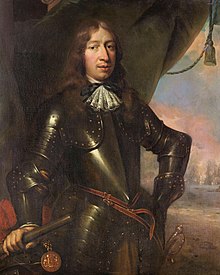Willem Joseph van Ghent
| Willem Joseph van Ghent | |
|---|---|

Baron Willem Joseph van Ghent by Jan de Baen courtesy of the National Maritime Museum.
|
|
| Born | 14 May 1626 Winssen |
| Died | 7 June 1672 (aged 46) off Solebay |
| Buried at | Cathedral of Saint Martin, Utrecht |
| Allegiance |
|
| Service/branch | Navy, Army |
| Years of service | 1648-1672 |
| Battles/wars |
Second Anglo-Dutch War, Third Anglo-Dutch War -Battle of Chatham -Battle of Solebay † |
Willem Joseph baron van Ghent tot Drakenburgh (14 May 1626 – 7 June 1672) was a 17th-century Dutch admiral. His surname is also sometimes rendered Gendt or Gent.
Van Ghent was baptised on May 14, 1626 in the church of Winssen. It is assumed he was born the same day. (See Dutch page for 2016 research and publication. Previously mentioned: born in Castle Gendt in the Betuwe; however, some sources have quoted Vianen as his place of birth) In 1642, he became provost of Elst, as a sinecure. Being a noble by birth, he made a career in the army from 1645 onwards; he started in the regiment of the Count of Hoorne; in 1648, he was promoted to the rank of captain, serving in said regiment. He first became connected to the navy when during the Northern Wars against Sweden in 1659, he executed a landing on the Danish island of Funen under command of Vice-Admiral Michiel de Ruyter. At that time, Van Gendt was an unsalaried major, commanding a regiment of Walloons. During this campaign, there was a large emphasis on and development of amphibious operations, involving Dutch naval officers like the later Rear-Admiral Frederick Stachouwer and Vice-Admiral Volckert Schram.
On 6 March 1663, Van Ghent was appointed a salaried major. On 3 December 1664, he was promoted lieutenant-colonel and was appointed as the military governor of Hellevoetsluis, the major Dutch naval port. This promotion was put forward by the threat of a new war with the English: in March 1665, Charles II of England indeed declared the Second Anglo-Dutch War. In August 1665, Van Ghent was present on De Ruyter's fleet relieving the Dutch treasure fleet at Bergen after the Battle of Vågen. The same year, he advised the leading politician of the Dutch Republic, Grand Pensionary Johan de Witt, to found a special marine corps, the Regiment de Marine, which was established on 10 December 1665. This is often seen as a precursor of the Dutch Royal Marine Corps. Van Ghent was to be its first commander, carrying the rank of colonel.
...
Wikipedia
